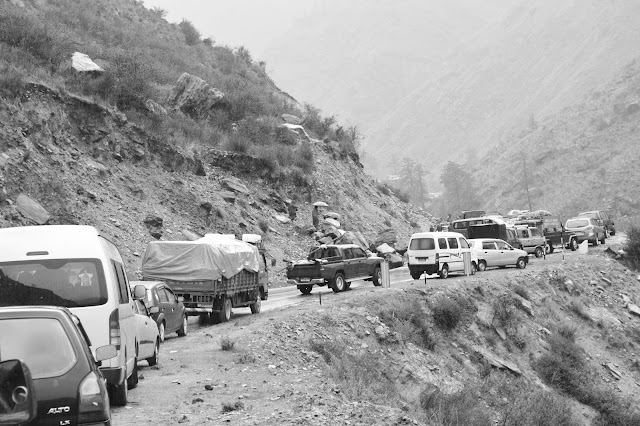A few days ago, I awoke to a flurry of activity on my Facebook newsfeed
discussing the Atlantic Magazine article
by Ann-Marie Slaughter, “Why Women Still Can’t Have It All.” In her thought
provoking essay, Slaughter argues that despite the courageous struggle fought
by previous generations of women, the work environment of prestigious, high
powered jobs continues to inhibit women, by forcing them into unnecessary and
unacceptable trade-offs between their parenting and professional commitments. An
intensely clientelist culture that fetishizes billable hours and frowns upon
those who dare prioritize family over work, even on weekends, has made it
impossible for women to lead healthy balanced family lives in a way that men in
similar positions often manage.
Slaughter, the former Director of Policy Planning at the State Department
and former Dean of the Woodrow Wilson School at Princeton, makes a compelling
case for the reconfiguration of the work environment to make it more family
friendly. Extend the hours of the school day. Increase the use of communication
technology to facilitate working from home. Change work culture, making default
practices more accommodating of familial commitments. Without substantial
reforms like these, not only are governments and firms going to continue to
lose talented female employees, making society writ large worse off, but women
will remain in an uphill struggle filled with unfair barriers that
systematically discriminate against them.
Many of my female Kennedy School peers have called on men to give their
opinion on the essay, some suggesting that we have little incentive to embrace the
proposed changes, others arguing that we have just as much to gain as women. So
as a man, what are my thoughts?
The core of Slaughter’s argument, as I read it, need not be gender
specific. It’s claim, rather, is that America needs to adapt its work culture
to embrace a new understanding of the good life. One that places family at its
core. For Slaughter, this is one where she is “able to spend time with [her]
children,” enjoying “the simple pleasures of parenting—baseball games, piano
recitals, waffle breakfasts, family trips, and goofy rituals.” These activities,
are common to millions of families across America, but are by no means
ordinary. They may not have the influence or financial earnings of a high power
job, but are nevertheless a rudimentary part of life. One that defines us,
satisfies us like nothing else. Family is not something to be sidelined by
professional commitments. No matter how important.
I full heartedly embrace Slaughter’s call. It is not clear to me, however,
why this invitation to re-imagine a more family friendly professional
environment is something that women specifically ought to value. The more
successful women have been over the past fifty years in redefining the
workplace as somewhere that everybody has a right to participate in equally,
the more men have seen their roles at home transform. Men now often make professional
sacrifices too for the sake of their family. This is something that I
experienced in my life for example. Just as my mother delayed the completion of
her degree to give my brother and I the support and attention we needed growing
up, my father, who had already earned his before we were born, then delayed his
PhD to make time in our teenage years to help us with our homework and coach the
soccer team.
These are things my grandfathers’ generation probably never would have even
thought, and were certainly never expected, to do. Spending time engaged in the
everyday rituals of parenthood may have been the sole remit of women in the bad
old days, but that is not to say that its simple magnificence is lost upon men
today now that times have changed. And this is perhaps my most important take
away from thinking about Slaughter’s article. Women’s liberation has not been a
zero sum game. Men who are now participating in their children’s lives more
than they otherwise would have are enjoying newfound meaning.
My best male professors at the Kennedy School all have spoken of things
like putting off the next book, skipping conferences, leaving office strictly
at 5.30pm or (appropriate in this case) returning from a dream job in
Washington because their spouse dislikes the capital. I was speaking to Martin
Wolf (a hard nosed economist from the Financial
Times) about his career a few months back, and he reflected adamantly that
if his job had ever gotten in the way of his marriage, he would never have
hesitated to find new employment. I do not mean to suggest that this is
representative of all, or even most men but it nonetheless indicates that men’s
priorities are changing.
What I liked about this essay was that it embraced family as the centre
of the solution, not part of the problem that ‘progress’ tries to solve.
Something that progress needs to accommodate, not be accommodated by. Part of
the directionality of our collective pursuits. It differs dramatically from the
message of Ibsen’s A Doll’s House for
example, where Nora, the protagonist leaves her children to escape her controlling
husband. I remember as a teenager being conflicted after the play, by a twin
sense of relief that she escaped her horrid life and anger that she had left
her children. I remember arguing that it doesn’t matter if you’re a man or a
woman, you’ve still got a responsibility to care for your children. This essay
pays head to this truth, and makes a better case, I believe, for a more just,
fair society because of it.
And I think men should, and will listen.
























